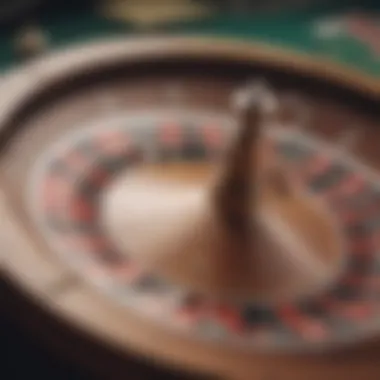Strategic Insights to Enhance Roulette Winning Techniques


Intro
Roulette often fascinates both seasoned players and newcomers alike. The spinning wheel, the bouncing ball, and the excitement that engulfs the casino floor creates an atmosphere that's hard to beat. However, many believe that winning comes down solely to luck. In reality, there are layers to the game that merit deeper exploration.
By looking at roulette through a strategic lens—mixing in understanding of odds, betting systems, and psychological factors—players can optimize their chances. This article aims to dissect the various techniques that may improve winning potential at the roulette table. From bankroll management to dissecting essential strategies, it’s more than just rolling the dice.
Betting Strategies
Understanding Odds and Probability
When it comes to the roulette wheel, odds and probabilities form the backbone of strategic play. The game features two main versions: European and American, with their own distinctive odds. The European version has a single zero, giving players a better edge; the American version, on the other hand, has a double zero that increases the house edge.
It's crucial to grasp not just the odds for winning on a given bet, but also what those odds represent in the long run. For instance, a bet on a single number has a 2.63% chance of winning in European roulette. While this might seem low, the payout of 35 to 1 makes it worthwhile for many players.
"Understanding the odds is not just about mathematics; it's about informed decision-making at the table."
Bankroll Management Techniques
Managing your bankroll effectively is vital to sustaining your gameplay. Nothing can shift the odds in your favor like having a solid plan for your finances.
- Set a Budget: Determine how much you can afford to lose before you sit down at the table. This will prevent you from chasing losses and risking money you can't spare.
- Use Units: Break down your budget into smaller units for each bet. For example, if you have a bankroll of $500 and want to make $10 bets, you can safely make 50 bets. This strategy helps you keep track of your spending.
- Time Management: Know when to walk away. Setting a timer can help you stick to your plan, thereby preventing hasty decisions after a winning or losing streak.
Implementing these techniques allows players to enjoy the game without fear of financial ruin.
Psychological Factors
Dispel Common Myths
Gambling often comes with a heap of superstitions and misconceptions. One common myth is the idea of "hot" and "cold" numbers, suggesting that some numbers are bound to hit based on previous spins. However, each spin is independent; the wheel has no memory. Understanding this can save players from falling prey to faulty logic.
Mental Preparation and Decision-Making
Mental clarity can significantly influence decision-making at the table. Before placing bets, players should engage in deep breathing or visualization of successful outcomes. This mental preparation fosters confidence and helps in making calculated bets instead of impulsive ones.
Players who understand these psychological dimensions can navigate the nuances of the game better than most.
In summary, rather than surrendering entirely to chance, developing a keen understanding of the odds, applying effective bankroll management, and being aware of psychological traps allows for a more nuanced and potentially successful roulette experience.
Understanding Roulette Dynamics
In the realm of gambling, understanding the dynamics of roulette is crucial for anyone looking to enhance their winning techniques. Roulette isn’t merely a game of luck; it operates on a set of mechanical principles and mathematical theories that, when grasped, can guide a player to make more informed decisions. Knowing how the game works can lead to a more strategic approach that fosters confidence and minimizes guesswork.
The Mechanics of the Game
Roulette revolves around a wheel, a ball, and a table marked with various betting options. At its core, the game involves betting on where the ball will land after the wheel is spun. This may sound straightforward, but the intricacies of the mechanics play a significant role in the gameplay.
When the dealer spins the wheel, the ball travels in the opposite direction, eventually losing momentum and landing in one of the numbered pockets—each designated by either a standard red or black color, with the exception of green for zero or double zero in American roulette. Each of these numbers holds a unique probability, and it’s important to understand how these mechanics can influence betting strategies.
The spinning wheel creates a blend of momentum and gravitational forces that are unpredictable. For players, this means embracing the inherent uncertainties while simultaneously employing strategies that consider average outcomes based on historical data—providing a blend of science and chance.
Types of Roulette: American vs. European
Not all roulettes are created equal. Understanding the differences between American and European roulette is key to formulating a winning strategy.
- European Roulette features a single zero, leading to a lower house edge of about 2.7%. This slight difference can make a monumental impact on a player's longevity in a game where every spin counts.
- American Roulette, on the other hand, introduces an additional double zero. This shift in the wheel's layout bumps the house edge up to approximately 5.26%. Here the extra pocket creates more avenues for losses as players' odds fluctuation changes drastically.
What does this mean for players? Simple really. If you're aiming to extend your bankroll and play longer, European roulette tends to provide better odds. This awareness allows players to tailor their strategies effectively, be it by choosing their favored style—like placing outside bets for a steadier approach or daring to go for single numbers in hopes of hitting a windfall.


Understanding these nuances can significantly influence one's gameplay. Ultimately, the grasp of roulette dynamics marries practical knowledge with strategic betting approaches—laying the cornerstone for aspiring players to bolster their success at the table.
"Knowledge can subtly dictate the difference between oblivion and profit at the roulette table."
As we navigate further into this discourse, we will explore the role of probability, delve into betting systems, and examine the psychological factors that sway decision-making—all vital pieces of the puzzle in mastering roulette.
The Role of Probability in Roulette
Understanding the intricacies of probability is vital in roulette, as it governs every spin of the wheel and influences how players approach the game. While roulette is often viewed as a game of chance, comprehending probability helps players make informed decisions, enabling them to maximize their betting strategies and optimize their chances of success. In a game defined by odds, elevating one's prowess in probability can be the distinguishing factor between a casual player and a strategic one.
The Basics of Probability Theory
Probability theory is foundational in gambling, particularly in games like roulette. Players encounter numerous outcomes, and grasping how likely each result is to occur is crucial. In essence, probability quantifies uncertainty, providing a mathematical way to assess risks. Each bet made in roulette—be it red or black, odd or even—has specific odds attached to it. Knowing these odds allows players to evaluate potential payouts against the risks involved.
For example, if you place a bet on single numbers, the probability of hitting your chosen number is 1 in 38 in American roulette, as there are 38 slots in total. Conversely, a bet on red or black gives you nearly a 50% chance of winning, though the inclusion of the green zero means it's slightly less than that.
Understanding House Edge
The term 'house edge' refers to the mathematical advantage that the casino holds over players. For roulette, this advantage varies slightly between the American and European versions of the game. The European wheel has a single zero, leading to a house edge of about 2.7%. On the other hand, the American version boasts both a single and a double zero, pushing the house edge to approximately 5.26%. This difference is not trivial and impacts how players should perceive their chances when placing bets.
The house edge is a reminder that, in the long run, the casino will profit from the game, so understanding it can inform your betting strategies. Players need to approach roulette with this reality in sight, ensuring they develop strategies that can potentially offset the impact of this edge, even if just slightly.
Risk Assessment and Bets
Assessing risk in roulette is an essential strategy that separates the informed players from the uninformed. Each type of bet carries its own level of risk and potential reward, and players must analyze where they want to place their money based on their personal risk tolerance and overall strategy.
- Low-risk bets might involve betting on colors or even/odd numbers, which yield frequent wins but at lower payouts.
- Moderate-risk bets would include betting on columns or dozens, providing a decent return while still maintaining a relatively good probability.
- High-risk bets, like betting on a single number, may result in substantial payoffs, but the chances of winning are significantly lower.
The balance of risk and reward is key. Players must engage in personal risk assessment, analyzing their own financial boundaries and comfort levels with loss. The objective should be to maintain a strategy that allows for calculated risks while still enjoying the game.
"The smartest gamblers evaluate their risks, knowing that while chance plays a role, skillful strategies can tip the odds in their favor."
By embracing the role probability plays in the game, players can build a resilient mindset that enhances their roulette gameplay and decision-making. It is not merely about the luck of the draw; it’s about reading the odds and positioning oneself strategically within the game’s framework.
Betting Systems: Pros and Cons
Understanding betting systems is crucial for anyone looking to enhance their roulette experience. These strategies can seem tempting, especially when the stakes are high. Each system presents its unique perspective on how to manage your bets, but they also come with their fair share of risks.
Pros:
- Provides structure to betting decisions.
- Some systems aim to recoup losses, making them appealing for those who seek to manage losses effectively.
- Encourages disciplined play, helping players stick to their budgets.
//
Considering cons: - No system guarantees a win, as roulette is inherently a game of chance.
- Players may become over-reliant on these systems, leading to poor decision-making.
- Certain betting styles can lead to quick depletion of bankrolls during losing streaks.
Understanding these aspects of betting systems can make a real difference in gameplay.
Martingale Strategy: The High-Stakes Approach
The Martingale strategy is one of the more famous betting systems, especially among those willing to take risks. The essence of this approach is simple: double your bet after every loss until you win. The idea is that a win will eventually cover all prior losses and yield a profit equal to the original stake.
Key Points to Consider:
- It's based on the law of averages, suggesting that a win must eventually happen.
- Requires a substantial bankroll, as the amount wagered can escalate quickly.
- If you hit a losing streak, the required bet can become astronomical.
"While many swear by the Martingale approach, patience and financial foresight are essential components of this strategy."
Fibonacci System: A Methodical Progression
The Fibonacci system takes a different route by applying a sequence of numbers in betting. Each number is the sum of the two preceding ones. So you start with one unit, and if you lose, you move to the next number in the sequence. Once you win, you return to two numbers back.


Advantages:
- This system results in smaller bet increases compared to Martingale.
- It caters to a more conservative betting style, which can be appealing for players aiming to minimize risk.
While it’s often seen as more manageable, it doesn’t diminish the inherent risks still present as you will still face losing streaks.
'Alembert Strategy: Balancing Risks
The D'Alembert strategy offers a balanced approach to roulette betting. Developed by French mathematician Jean le Rond d'Alembert, this system focuses on increasing your stake by one unit after a loss and decreasing it by one unit after a win. Unlike the Martingale, which aggressively doubles bets, this method advocates for a slightly more conservative pace, which makes it more sustainable over the long haul.
Pros:
- It helps in managing the bankroll, preventing drastic losses in a single series of bets.
- Provides a psychological safety net, often making it easier to stick to a betting budget.
Despite its merits, it’s worth remembering that the risks associated with roulette remain consistent.
Flat Betting: A Sustainable Technique
Flat betting is perhaps the simplest form of betting strategy where players wager the same amount on every bet, regardless of the outcome. This approach, while not aiming to minimize losses or maximize winnings, emphasizes self-control and discipline.
Benefits of Flat Betting:
- Reduces the chances of going broke quickly, promoting longevity in sessions.
- Allows for a steady pace, as players avoid emotional decision-making based on wins or losses.
By sticking to a consistent bet, players gain a higher probability of enjoying their time at the table without the stress that fluctuating bets can induce.
In sum, understanding the pros and cons of various betting systems can significantly impact your roulette journey. Each system has its place, but caution is key. No matter the approach, remember that roulette remains a game of luck, and responsible play is paramount.
Psychological Factors in Gameplay
The impact of psychological factors on gameplay is often underestimated, yet understanding this sphere is crucial for anyone engaging with roulette. Emotions, mindset, and environmental influences can significantly tilt the odds, often more than mathematical strategies alone. Players need to be aware of these dynamics to enhance their winning potential and make informed decisions while playing.
The Gambler's Fallacy Explored
The gambler's fallacy refers to the mistaken belief that past events influence future outcomes in games of chance like roulette. For instance, if a player observes the ball landing on red several times consecutively, they might irrationally assume that black is "due" to appear. This flawed reasoning can cloud judgment and lead to poor betting choices.
Recognizing that each spin is independent can liberate players from the chains of this fallacy. It amplifies the understanding that luck is random, and recognizing this can help in making choices based on calculated risks rather than whims born from previous outcomes.
Emotional Control During Play
Emotion plays a central role in gambling. It's easy to ride the emotional wave of a big win or a tough loss. Highs and lows can create a seesaw effect, often leading to impulsive decisions like chasing losses. A player might find themselves doubling down in a moment of frustration, dancing precariously on the edge of sound judgment.
Setting strict rules before starting can help maintain emotional discipline. Consider adopting strategies, like limiting the time or the amount of money for each session. Such measures can help keep emotions in check and prevent erratic decisions that could derail a good session.
The Influence of Environment on Decisions
The atmosphere of a casino can heighten emotions and blur the lines of rational thinking. Bright lights, the sound of chips, and the energy from other players can create an intoxicating environment that might distract a player from their strategy. This sensory overload often leads players to make decisions that are incompatible with their original plans—often to their detriment.
To counteract this, players might benefit from establishing a calm pre-game routine or selecting a less chaotic setting to play in, if possible. Better focus leads to improved decision-making and can alleviate stress, ultimately shaping a player’s overall experience positively.
Understanding how psychological factors govern decision-making can be as crucial as mastering the game's mechanics. Knowledge is power, especially in a realm modified by emotion.
Being aware of these psychological dimensions can fundamentally change how one approaches roulette. By blending emotional intelligence with strategic insight, players can navigate the unpredictable nature of the game with a clearer head, improving their odds of success.
Factors Impacting Winning Potential
In the realm of roulette, the dynamics of winning can be subtle and complex. It's not just about spinning the wheel and hoping for the best; rather, strategic factors play a significant role in shaping outcomes. Here, we will explore critical elements that enhance your chances of walking away with a win. By understanding these factors, players can develop informed approaches that go beyond guesswork.


Bankroll Management Techniques
One of the cornerstone principles in gambling is effective bankroll management. It’s much like budgeting for any other kind of expense; you need to know your limits before diving in. A solid strategy ensures that your play last longer and ups your chances at the tables. Here's how to craft your strategy:
- Set a Budget: Establish a clear limit for how much you're willing to spend. This helps you avoid chasing losses and keeps your play in control.
- Time Management: Besides the money, time spent playing affects your overall winnings. Setting a time limit helps to minimize fatigue and rash decisions stemming from prolonged play.
- Adjusting Bet Sizes: Align your bets with your bankroll—higher bets may seem tempting but they could drain your funds quickly. Starting small allows you to gauge the game’s rhythm and adjust accordingly as your confidence builds.
Remember, bankroll management isn’t just about saving money; it’s also about extending your gameplay and increasing the overall excitement while you wait for that lucky number to hit.
Choosing the Right Casino
Another vital aspect that often receives less attention is selecting the right casino. A well-chosen venue can significantly impact your experience and winning potential. Here are some considerations:
- Game Variations: Not every casino offers the same variants of roulette. European roulette has a single zero, while American roulette adds a double zero, which impacts the house edge. Choosing a venue that provides the variation with better odds is essential.
- Reputation and Trust: Opt for casinos with positive reviews from fellow players. Look up experiences on platforms like Reddit or check dedicated gambling forums to gauge the reliability.
- Promotional Offers: Many casinos run promotions or offer loyalty programs. Take advantage of these perks, as they can serve as an extra cushion for your bankroll.
“Selecting the right casino is as pivotal as having a solid betting strategy; it affects every aspect, from odds to the general atmosphere.”
Ethical Considerations and Responsible Gambling
In the world of roulette and gambling at large, engaging in ethical practices is paramount. The thrill of the game might lure players into a whirlwind of excitement, but it is essential to remember that responsible gambling shouldn't be an afterthought. It lays the foundation for a healthy and sustainable relationship with gaming, ensuring that the joy it brings does not morph into distress or addiction.
Understanding the significance of ethics in gambling is fundamental. Ethical gambling practices not only honor the integrity of the game but also safeguard players’ well-being. When one enters a casino or plays online, the initial excitement can quickly spiral into reckless decisions if caution is thrown to the wind. Emphasizing ethical considerations brings light to the necessity of self-regulation, awareness of personal limits, and respect for the game itself.
Identifying Problem Gambling Behaviors
Recognizing the signs of problem gambling is a critical skill for both players and those around them. It can be challenging to discern when casual gameplay crosses over into hazardous territory. Below are some behaviors to watch for:
- Increased Frequency and Stakes: When betting becomes more frequent, often with higher stakes, this can indicate an escalating issue.
- Chasing Losses: This occurs when players intend to recover lost money, leading to even greater losses, creating a vicious cycle.
- Neglecting Responsibilities: A noticeable decrease in fulfilling personal, professional, or social obligations due to gambling can be troubling.
- Emotional Changes: Increased irritability, anxiety, or restlessness when not gambling might signal deeper issues at play.
Being aware of these signs is not just about recognizing them in oneself but also in friends or family members. Open discussions and fostering a supportive environment can help combat these behaviors before they become unmanageable.
Resources for Responsible Gambling
Fortunately, there are numerous resources available to players looking to ensure responsible gambling practices. Here are some avenues for support and information:
- Self-Assessment Tools: Websites like National Council on Problem Gambling provide quizzes and assessments to gauge one's gambling behavior.
- Helplines: Professional help is just a call away. Many organizations have hotlines providing immediate assistance to those in need.
- Support Groups: Participating in groups like Gamblers Anonymous offers a platform for sharing experiences in a safe space.
- Educational Material: Many resources, both online and offline, that educate players about responsible practices can be beneficial in promoting healthier habits.
"Understanding the boundaries of enjoyment and harm is the first step towards a sustainable gambling experience."
Playing roulette can be fun, but recognizing when it becomes detrimental to one’s well-being is crucial. Ethical considerations and responsible gambling practices serve as the compass guiding players toward a safer and more enjoyable gaming environment.
Culmination: Balancing Technique and Luck
As one delves into the essence of roulette strategies, it becomes glaringly evident that the interplay between technique and luck is fundamental. Achieving success in roulette is not merely rooted in one’s grasp of betting systems or psychological tactics. It’s about recognizing that randomness is an inherent component of the game, and no strategy can entirely override the influence of chance.
The Nature of Roulette
Roulette, with its spinning wheel and bouncing ball, is wizardry dipped in uncertainty. A player can employ the most sophisticated methods—be it the Martingale, Fibonacci, or flat betting strategies—but the outcome still hinges on the whims of fate. An experienced player understands this dichotomy: technique paves the way for thoughtful play while luck remains the ever-present wild card.
Strategies Enhance Odds, But
Strategic betting lends itself to lowering the house edge, enhancing potential returns. For instance, by choosing European roulette, where the single zero reduces the house edge compared to its American counterpart, a bettor can slightly shift the odds in their favor. Yet, even with informed choices, the unpredictability of every spin means that no amount of skill can guarantee success.
A seasoned gambler knows when to push their luck and when to pull back—a delicate dance that can define their evening at the tables.
Psychological Advantages
Moreover, psychological resilience plays a crucial role. The understanding of one's emotional states while gambling can influence decisions, leading to more calculated risks instead of impulsive bets. Staying cool under pressure allows a player, regardless of strategy employed, to make informed decisions rather than succumbing to the ebbs and flows of chance and emotion.
Final Thoughts
In summary, while a robust technique can elevate one’s game and refine a player's approach, the truth remains stark: roulette is as much about luck as it is about strategy. The melding of informed methods and acceptance of randomness creates a balanced outlook.
Thus, moving forward, players should cultivate a mindset that embraces both angles. Recognizing the role of luck shouldn't be viewed as relinquishing control; rather, it should empower decisions to be made with clarity, foresight, and wherewithal. This balanced strategy can yield the most rewarding experiences in the captivating realm of roulette.















